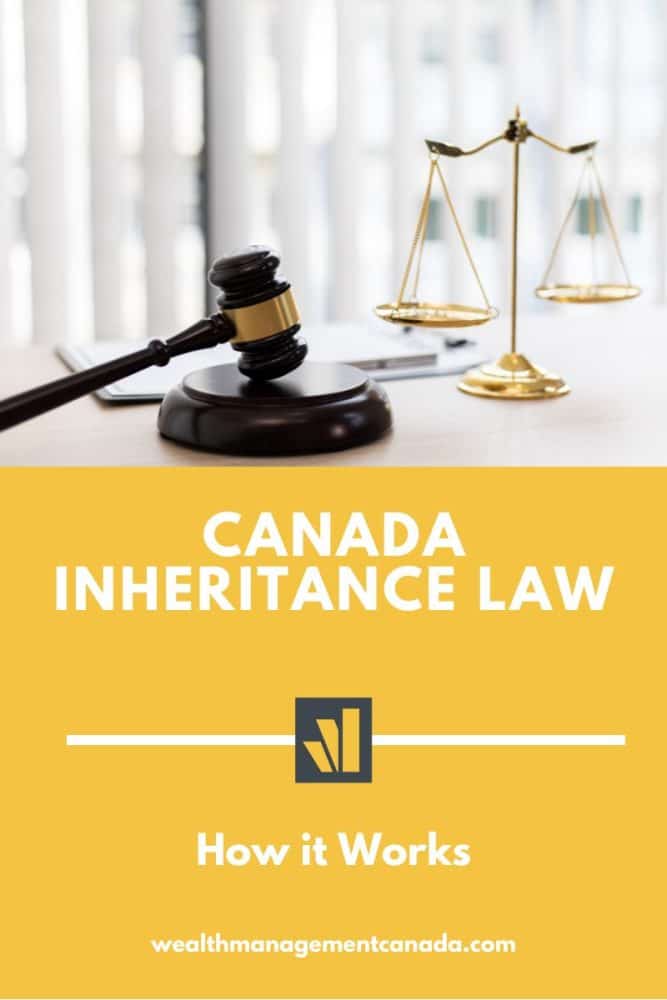Today’s Canadian senior has an average net worth of $543,200. Chances are, someone will inherit those assets — at least, almost 45% of Canadians expect to receive an inheritance. But Canada’s inheritance law, more specifically provincial laws, have certain rules for leaving behind your assets. You’ll need a will to ensure your final wishes are respected, otherwise the government does what they think is best and is according to Canada’s inheritance law.
Our wealth managers help tons of Canadians draft wills and strategize investment strategies to preserve their assets. Still, it always helps to build your own awareness and knowledge of the laws at play. Brushing up on Canadian inheritance law is great prep work for estate planning. Today, we’ll cover the ins and outs of inheritance law, how to preserve your wealth for your beneficiaries, and why a will is absolutely essential — way before you reach senior age.

Table of contents
What is inheritance law in Canada?
Here’s the thing: the federal government doesn’t actually have a set law or statute dictating the process of inheritance. The only thing Canada requires of all Canadians is a final return from every estate (more on that shortly).
Let’s look at an example of provincial inheritance law at work, starting with Ontario’s statute of limitations. Say your biological father passes away without a will, and the government representative doesn’t know you’re in the picture. Well, you have a claim to at least part of that inheritance. You just have to make that claim before the statute of limitations runs out.
In Ontario, the Limitations Act, 2002, cites a period of two years. However, this is a general statute and doesn’t apply to inheritances. For inheritance law, we refer to the Succession Reform Act, 1990, which specifies inheritance statutes of limitations as six months.
Keep in mind that this law doesn’t apply if a deceased person clearly outlines his or her wishes for their assets and savings in a will. They have the right to choose exactly where their life’s assets go (save for any owed taxes), so it’s difficult for someone to make a claim to any of it.
Another unique situation where the statute of limitations applies is if a child is born after a person’s death. In this case, the child could be born up to three years after the deceased person’s date of death (consider frozen sperm, for example) and would have a claim to part of that inheritance.
Regardless, the courts have the power to make exceptions. They may allow claims made after the statute of limitations runs out in special circumstances.
Related Reading: Will Planning Guide Canada

START WORKING WITH A WEALTH MANAGER NOW
How do Canadian inheritance laws work?
In Canada, inheritance is a way to pass down your life’s work to your children, spouse, family, friends, or charities. Usually, you’ll name your beneficiaries (people who will inherit) and identify how much money goes to each one in your will. You’ll also appoint an executor to carry out your will’s final wishes and file a final return. Upon your death, your beneficiaries will receive their inheritances within a few months. That is, if you cover all your tax and legal obligations first.
Is there an inheritance tax?
Plenty of countries have inheritance taxes, like Finland, Ireland, Turkey, and certain states in the US, like Pennsylvania. But Canada does not have an inheritance tax. That means once your beneficiary receives their inheritance, they don’t have to pay any tax on it.
Why? Well, the CRA does their collecting before your inheritance makes it to your beneficiaries. This is called the final return, where your executor files and declares your estate’s assets, income, capital gains, and anything else that might be taxable. Once the CRA gets its piece, your beneficiaries are in the clear.
Don’t forget about Canada’s administration estate tax, or probate tax. This only applies to estates worth more than a certain amount. The exact amount of probate depends on the province or territory which you reside. Consult a wealth manager for strategies on minimizing your estate taxes. Your strategy might include dispersing wealth while you’re still alive, purchasing life insurance, or adding your spouse’s name to certain properties prior to death.
Related Reading: How inheritance works in Canada
Can the Canadian Government take your inheritance?
Not quite. Once you file your final return and pay all your applicable taxes, the CRA has no reason to interfere with your beneficiaries’ inheritances. However, the final return might spike your tax obligation to a high burden you didn’t anticipate. This is where the Canadian government could deplete much of your estate before it makes it to your beneficiaries.
On top of that, you could run into trouble if you’ve declared bankruptcy. In this case, all your assets and savings are fair game for your creditors, and the CRA, if unpaid taxes are in the picture as well.
Does a spouse automatically inherit everything in Canada?
In some cases, yes. Specifically, if a person dies intestate (without a will), then a spouse can inherit the person’s estate absolutely. However, if that same scenario includes a child, the spouse and child split the estate two ways. Similarly, two children in the picture mean the spouse and kids split the estate three ways, and so forth. This split is still maintained even if a child dies before the deceased person in question. In this case, their share is maintained and transferred to their estate.
If it’s proven that a spouse is separated from a deceased person before their death, the spouse isn’t automatically entitled to the entire estate.
There’s also the stipulation of preferential share — a maximum amount a spouse is entitled to if a deceased person dies without a will. In Canada, that figure is $385,000. If you’re uncertain about what your spouse would be entitled to upon your death, you might consult with a wealth manager.
Related Reading: Is inheritance money split in a divorce in Canada?
Who gets inheritance if there’s no will in Canada?
If a person dies without a will, a government-appointed trustee will disperse the estate’s assets based on the Succession Reform Act, 1990. To start, the inheritance will be split amongst the surviving spouse and children.
No spouse or children? The trustee will look at the deceased person’s parents, siblings, nephews and nieces, or next of kin. If no next of kin is found, the estate becomes property of the Crown, aka the government.
How long does it take to get inheritance money in Canada?
Most beneficiaries wait 3 to 6 months before accessing their inheritance. But that’s assuming the inheritance is smooth. Plenty of families fight over inheritances and wills which adds months, sometimes years, to the process.
One psychology expert tells Forbes that the reason behind this commonality is our money-obsessed culture. This is especially difficult if a person doesn’t leave behind a will — in that case, a government-appointed representative might take a bit longer to execute the will.
Related Reading: How long does it take to receive inheritance from a will Canada?
How to protect your assets
Here are four vital steps to take to protect your assets in Canada:
- Will: Step one? Write a will, pronto! One study shockingly discovered that about 52% of Canadians don’t have a will. This is a recipe for wealth loss and confusion amongst your family members.
- Organize your finances: Keep track of all your finances and assets, including insurance, real estate, investments, bank accounts, and debts. You might also order a copy of your credit report to review any existing debts that you want to address before you pass. Remember, anything joint means your cosigner will inherit that debt.
- Consult a lawyer and/or wealth manager: Canada inheritance law is tricky, especially if you’re dealing with tons of capital gains tax, unclear business income, or familial disputes among your children. You should always consult a lawyer and wealth manager as you write your will to ensure you protect your wishes. Moreover, a lawyer and wealth manager can help guide you in reducing your tax burden before you pass, helping you preserve your assets and give as much of it as possible to your beneficiaries.
- Decide on an executor: Who do you trust to carry out your wishes laid out in your will? If you don’t name anyone, the government will appoint a trustee who will follow an all-encompassing template on how to disperse your assets.
Related Reading: Receiving an Inheritance in Canada
Why wills are essential
Imagine working your entire life to build a robust investment portfolio, real estate empire, or antique collection just for the government to decide where it goes after you pass.
A will helps you maintain autonomy both during and after your life ends, ensuring you have the final say about where your money goes. It helps you support your spouse and children, and gives an executor that you trust power to help you reduce your tax burden.
Still, Canada inheritance law by province varies. Things can get confusing if you don’t have a financial or legal background.
Our advice? Don’t tackle your inheritance and estate planning alone. There’s no need when you have so much support available. Here at Wealth Management Canada, we help thousands of Canadians preserve and manage their wealth, including upon death. Why not get a head start? Talk to a wealth manager today!
Read More: Income Splitting Canada

START WORKING WITH A WEALTH MANAGER NOW